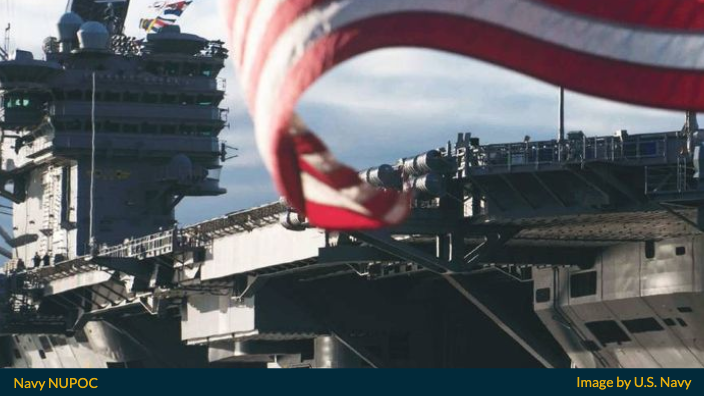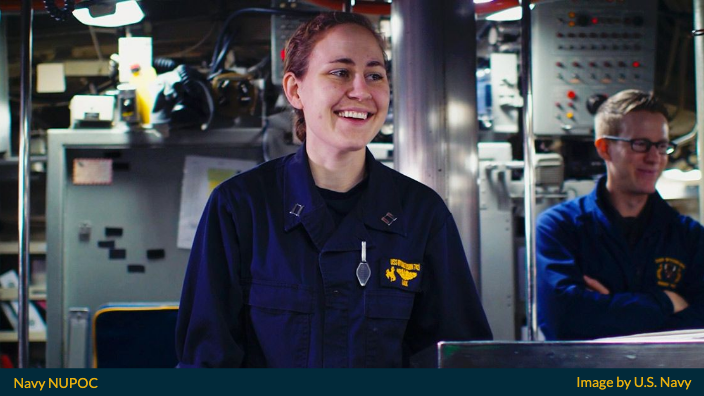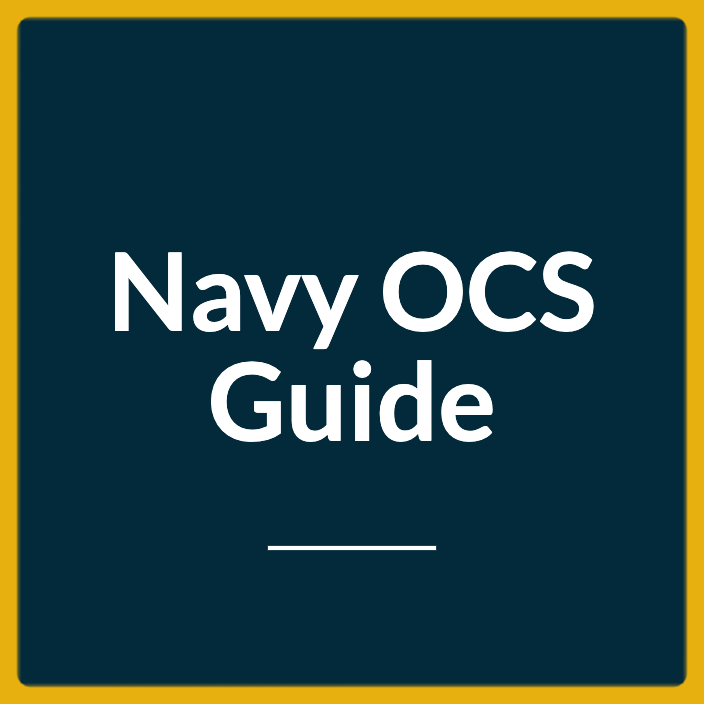Last Updated on March 4, 2024
This guide provides useful information about the Navy Nuclear Propulsion Officer Candidate (NUPOC) program for Fiscal Year 2024.
This program is of tremendous value to students but is unfortunately not well known.
Here, you will learn about the program, its requirements, and what to expect upon commissioning.
Let us start with the essentials.
What is the Navy Nuclear Propulsion Officer Candidate Program?

The Nuclear Propulsion Officer Candidate (NUPOC) program is a scholarship program offered by the U.S. Navy for college students in STEM fields who wish to serve as commissioned Navy Nuclear Officers upon graduation.
With the NUPOC program, the U.S. Navy aims to fill its nuclear training pipeline with the most talented American college students who will eventually lead the Navy’s nuclear community.
NUPOC Benefits
If you want to be a part of one of the world’s top nuclear operations, consider the NUPOC program.
You can do the following in the Navy’s demanding Nuclear Propulsion training program:
- Earn up to $168,300 while completing your degree
- When you are accepted into the program, you will get a sizable incentive bonus
- Competitive salary, regular pay raises, additional pay, and bonuses for specific duties
- Earn yearly incentives of up to $40,000 for each year of service beyond your first commitment
- While you are a student in the program, you can take advantage of comprehensive military health care benefits
- Opportunities for postgraduate education
- 30 days of vacation with salary every year
- Tax-free housing and food allowances
- Low-cost life insurance
- Cost-effective shopping at military commissaries and retail stores (exchanges)
- Comprehensive retirement program
- Allow your college years while enrolled in the program to count toward your retirement
- While in college, you will serve as a full-time student with no military responsibilities
- Gain early important leadership, engineering, and management expertise that is in great demand among civilian companies
There are no service requirements until you graduate and begin becoming a Navy Nuclear Officer.
Salary, bonus, and benefits are subject to change.
For the most up-to-date information, contact a recruiter.
Navy Nuclear Jobs

This highly competitive program will prepare you to be successful in any of the following professional categories.
Examine the training, prerequisites, advantages, and other details for each below:
Submarine Officer
Nuclear Submarine Officers drive, arm, power, and operate the Navy’s fleet of attack, ballistic missile, and guided missile submarines.
The stealth technology and superior combat capabilities of these nuclear-powered warships, along with the sheer ability of those in command, have resulted in years of effective conflict engagement and deterrence.
Naturally, the officers who command these $2 billion boats are held to the highest standards and have exceptional tasks and responsibilities.
Only a few disciplined and devoted Officers are given the opportunity to command some of the world’s most technologically advanced equipment.
Read more about the Navy Submarine Officer program.
Nuclear Surface Warfare Officer
A nuclear-powered aircraft carrier is equipped with two reactors, 85 aircraft, 5,500 crew personnel, and limitless potential.
Consider yourself in command of a 97,000-ton nuclear-powered aircraft carrier of the Nimitz class.
Your aim is to travel the world to support American interests and commitments. While your civilian contemporaries may still fantasize about managing a small technical team, you will oversee a virtual small city at sea, overseeing the operation and maintenance of extremely complex nuclear propulsion units.
Your training begins on conventionally powered combat ships. You will then qualify as a Surface Warfare Officer on this tour and begin your successful career on board one of the Navy’s most competent and technologically sophisticated surface ships.
Following that, you will go through a year of intense technical training before being sent aboard a nuclear-powered aircraft carrier to occupy a technical leadership role.
Read more about the Nuclear Surface Warfare Officer program.
Naval Reactors Engineer
The Navy Nuclear Propulsion Program is headquartered in Washington, DC.
It is manned by top engineers who monitor every part of the program.
At Naval Reactors headquarters, jobs include approving, confirming, and planning the design, operation, and maintenance of over 100 nuclear reactors.
The Naval Reactors Engineer experience begins with a post-graduate level nuclear engineering study at Bettis Atomic Power Laboratory.
You will be assigned a five-year employment at Naval Reactors headquarters upon completion.
Read more about the Naval Reactors Engineer program.
Nuclear Power Training Unit Instructor
The operational, highly dynamic Nuclear Power Training Unit (NPTU) is the apex of the demanding nuclear training pipeline.
These ultra-modern training reactors are in Charleston, SC and Ballston Spa, NY.
The highly skilled instructors guarantee that all fleet personnel of the Navy’s Nuclear Program, including officers and enlisted, acquire hands-on training, allowing for a smooth transition to the fleet.
NPTU Instructors will complete the whole Nuclear Propulsion training pipeline, allowing them to pursue other educational possibilities.
You will get operational leadership and managerial experience by leading and supervising a watch team at one of the world’s most active nuclear power facilities.
You will gain essential hands-on experience with working nuclear reactors as an NPTU Instructor.
Read more about the Nuclear Power Training Unit Instructor program.
Nuclear Power School Instructor
Nuclear Power School (NPS) instructors teach all officers and enlisted members of the Navy Nuclear Propulsion Program.
As a NPS instructor, you will receive important teaching experience in a curriculum that is both interesting and technologically advanced.
NPS instructors work in a campus-like setting to teach courses at both the graduate and undergraduate levels.
It is a fast-paced program taught in a demanding, highly technical atmosphere that offers exceptional personal and professional rewards.
Math, physics, electrical engineering, heat transfer and fluid flow, materials, chemistry, radiological principles, and nuclear plant engineering are among the subjects covered.
Read more about the Nuclear Power School Instructor program.
NUPOC Eligibility Requirements
The following requirements are current as of November 2023, per the Navy Personnel Command. No updates have been issued thus far.
Citizenship
NUPOC applicants must be United States citizens.
Age
At the time of commissioning, applicants must be at least 19 years old and no older than 29 years old.
Waivers may be considered on a case-by-case basis for those who will be under the age of 31 at the time of commissioning.
Physical
All applicants must meet physical standards under the Unrestricted Line criteria established in Chapter 15, Manual of the Medical Department.
Prior to commissioning as a Nuclear Officer, program participants must achieve the medical qualifications for nuclear field duty/ionizing radiation.
Education
All applicants must have finished or be pursuing the prerequisites for a bachelor’s degree from a regionally accredited college or university in the United States or its territories, and they must fall into one of the following categories:
Undergraduate Students
Candidates must be actively pursuing a bachelor’s degree, within 3.5 years of completing their studies, and enrolled full-time during a standard academic year.
Those who may take longer than the typical duration for their programs (more than 4 years for a 4-year course or more than 5 years for a 5-year course) will be assessed individually to determine if they can enlist for active duty prior to graduation.
Candidates working towards dual bachelor’s degrees are required to obtain both degrees simultaneously, without receiving one before the other.
For those pursuing combined bachelor’s and master’s degrees, they should be within 4.5 years of completing their studies, enrolled full-time during a regular academic year, and expected to finish their graduate studies within a year after earning a bachelor’s degree.
Should a candidate be unable to complete the master’s degree within the allotted timeframe, they must withdraw from college and join the earliest available OCS class.
Applicants not chosen during the interview can reapply after completing at least one more academic year (two semesters or three quarters), provided they fulfill the necessary educational requirements.
Those admitted through this process will have their academic progress reviewed after each term, needing to achieve at least a “C” grade in all technical, math, and science courses.
Exceptions to this rule can be suggested by OPNAV N133 and must be approved by the Director of Naval Reactors on a case-by-case basis.
Undergraduate students failing to meet academic standards may be removed from the NUPOC program by OPNAV N133.
Additionally, undergraduates assessed under this section must commit to enlist as per subparagraph 8a if selected by the Director of Naval Reactors.
Post-Graduate Students
Candidates should have obtained a bachelor’s degree and currently be pursuing a master’s degree at a regionally accredited institution in the United States or its territories, with the expectation of completing their master’s within one academic year.
These individuals must commence Officer Candidate School (OCS) within one calendar year of joining the program.
Should a candidate not fulfill their degree requirements within this designated period, they will be obliged to withdraw from their academic program and enroll in the earliest available OCS session.
Education Waiver
Candidates may submit a written request for a waiver, which will be evaluated individually, under the following circumstances:
- If they are unable to finalize a post-graduate degree within the designated time frame, assuming they are currently enrolled in such a program.
- If they have not fulfilled the prerequisite of completing one academic year (equivalent to two semesters, two trimesters, or three quarters) of college-level calculus, focusing on Differential and Integral Calculus of a single real variable, with at least a “C” grade.
- If they have not satisfied the requirement of finishing one academic year (equivalent to two semesters, two trimesters, or three quarters) of calculus-based physics at the college level, which should include the essential principles of mechanics, magnetism, and electricity, achieving a minimum grade of “C”.
- If they have not adhered to the mandate of attending at least one semester, trimester, or quarter of both physics and calculus courses in a traditional classroom setting.
All Student Applicants
For the purpose of assessing eligibility, the term “curriculum” refers to the entire duration of an applicant’s undergraduate education. The date when the first bachelor’s degree is awarded is regarded as the end point of the undergraduate curriculum.
Every candidate is required to submit a detailed plan for degree completion that aligns with their projected graduation date.
Candidates are prohibited from extending their anticipated time in college, discontinuing attendance, transferring to another institution, participating in exchange programs, or changing their major field of study without explicit approval from OPNAV N133.
All applicants must have completed the following necessary coursework either on-campus or through distance learning programs provided by regionally accredited colleges or universities:
Calculus
Applicants are required to have successfully completed one academic year, which could consist of two semesters, two trimesters, or three quarters, of college-level calculus.
This coursework should encompass both differential and integral calculus pertaining to a single real variable, with a minimum grade of “C” or higher.
While waivers for this prerequisite may be evaluated on an individual basis, at least one part of this calculus requirement must be fulfilled through traditional, in-person classroom instruction.
Physics
Candidates must complete one academic year, equivalent to two semesters, two trimesters, or three quarters, of college-level calculus-based physics.
This course should cover the fundamental principles of mechanics, magnetism, and electricity, with the student achieving a grade of “C” or higher.
Although consideration for waivers to this requirement can be made on an individual basis, it is mandatory for at least one portion of this physics coursework to be conducted through traditional, in-person classroom attendance.
Candidates who took the aforementioned courses as advanced placement courses in high school and were granted permission by their institution to validate these courses, as well as taking an extra course in college beyond these prerequisites, will be deemed eligible.
Once admitted into the NUPOC program, candidates are not permitted to engage in co-op or work-study programs if such participation would result in postponing the graduation date established at the time of acceptance.
If candidates opt to partake in optional co-op or work-study initiatives during the fall, winter, or spring terms, they are required to enroll in summer sessions to maintain their projected graduation timeline.
Additionally, the coursework and credits completed during these summer sessions must be comparable in volume and value to what would typically be achieved during a regular fall, winter, or spring term.
Who May Apply
Eligibility for the program extends to:
a. Individuals who have either completed or are currently pursuing a degree at an undergraduate or graduate level from a regionally accredited institution of higher education.
b. Alumni and current members of the United States Naval Academy and Navy Reserve Officer Training Corps (ROTC), including those from both scholarship and college programs who have benefited from financial support such as pay entitlements, subsistence allowances, tuition, or fees, are eligible. However, they may only commence active duty following their graduation.
c. Members of the Navy, whether serving in active or reserve capacities within the regular forces or the Navy Reserve.
d. Enlisted personnel from other military branches, both active and reserve, provided they have obtained a conditional release from their current service obligations.
e. ROTC members from the Army and Air Force who are under contract must secure a conditional release to be eligible. This requirement does not apply to ROTC members without a contract or to individuals enrolled in the Marine Corps Platoon Leaders Class.
What to Expect Upon Selection
If approved by the Director, Naval Reactors, candidates will be required to attend a one-day orientation in the Washington, D.C. region.
After completing orientation, applicants will choose one of the following options:
- Individuals are required to enlist and will be assigned an active-duty status as either an officer candidate at the E-6 level or an E-7 in the Naval Reserve, depending on the initial period of active service agreed upon in their contract. Those opting for roles in Submarine and Surface Nuclear fields who enlist at the E-7 level are obligated to agree to a commitment that involves signing a contract for a nuclear officer continuation bonus (COBO) after successfully passing the Prospective Nuclear Engineering Officer (PNEO) examination.
- Candidates are enlisted and assigned to an inactive Naval Reserve status as an officer candidate at the E-6 or E-7 level if they are designated as inactive before being accepted into the program. For those pursuing positions in Submarine and Surface Nuclear areas who enlist at the E-7 level, it is mandatory to agree to a future commitment. This involves signing a contract for a nuclear officer continuation bonus (COBO) after successfully completing the Prospective Nuclear Engineering Officer (PNEO) examination.
- College graduates who join the program are required to enlist and will be placed in an active duty status as an officer candidate at the E-6 level within the Naval Reserve. This status is maintained until they complete Officer Candidate School (OCS), at which point they will be officially commissioned as officers.
Candidates have the option, with prior consent from OPNAV N133, to postpone their enlistment decisions for up to 30 days following their interview at Naval Reactors.
Should any additional coursework be completed before finalizing their enlistment choice, it is imperative that the transcripts be submitted and evaluated before proceeding with the enlistment process.
Following graduation from college, the formal training procedure for becoming an officer in the Naval Nuclear Propulsion program begins.
The first stop is Navy orientation training, which takes place in Newport, RI, at either Officer Candidate School (OCS) or Officer Development School (ODS), depending on the program chosen.
Also Read: Navy OCS Guide for Officer Applicants
Following initial military training, job-specific nuclear training will begin.
Individuals determined to be physically unqualified for the nuclear field will be issued a designator based on the Navy’s needs and the individual’s aspirations.
After Navy OCS
After successfully completing Officer Candidate School (OCS), candidates are commissioned as Ensigns in the unrestricted line of the U.S. Navy, with the specific designators of 1170 for submarine training or 1160 for surface training. If a candidate is deemed not physically qualified for submarine duties post-commissioning and after joining the program, they will be reassigned the 1160 designator and placed within the nuclear surface warfare sector. In cases where an individual is found not physically fit for any duties in the nuclear field, they will be given a new designator that aligns with the Navy’s requirements and the individual’s preferences as closely as possible.
NUPOC Service Obligation
For individuals enlisting according to the terms outlined, the NUPOC commitment includes a minimum of five years of active service upon receiving their commission. The total service obligation extends to eight years, with the possibility of fulfilling the remainder of this period in a Ready Reserve capacity.
Candidates aiming for roles in Submarine and Surface Nuclear fields who enlist at the E-7 level are required to enter into an agreement to sign a contract for a nuclear officer continuation bonus (COBO) after successfully passing the Prospective Nuclear Engineering Officer (PNEO) examination.
This agreement will increase their active service commitment to a minimum of nine years.
More Information
If you wish to learn more about the Navy NUPOC program, the next logical step is to contact your local Officer Recruiter.
Find out if becoming a Nuclear Officer in the Navy is even right for you.
Hope you find this useful as you plan your educational and professional career.


